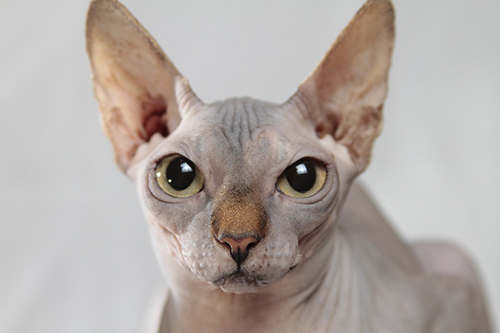Media – Sphinx calls Ork
Regurgitation is Dangerous
Question:
Blue Boy is a Sphynx cat, 13 years old. Ever since he was a kitten he has scooped food into his mouth like a bull dozer and chewed it while growling. After he stuffed himself he would regurgitate it and run away. I fed him tiny amounts at a time and he was able to keep that down. He acts hungry all the time. Is my cat bulimic?
Dr. Nichol:
Blue Boy is not bulimic. Even if he were a fashion model he wouldn’t care what anyone else thought. He’s a cat for cryin’ out loud! His constant hunger suggests that very little of the food he swallows actually passes into his intestines and gets digested and absorbed. He acts hungry because his brain thinks he is starving.
Regurgitation (a different beast than vomiting) occurs when food comes back almost immediately after being swallowed, usually because of a partial blockage of the esophagus-the tube that carries food from the throat to the stomach. Vomiting, on the other hand, takes longer to occur because it results from disorders of the stomach, small intestine, other internal organs like the kidneys or liver, or in some cases, the nervous system.
Blue Boy’s lifelong history of regurgitating has me suspicious of a constriction of his esophagus, the most likely cause being a birth defect called a vascular ring anomaly. Arteries in the chest that were necessary during fetal development can remain long after they should have naturally atrophied and disappeared. If these blood vessel remnants encircle the esophagus, only small amounts of food can pass, leading to a perpetually hungry cat who hurls shortly after swallowing. This could turn more dangerous. If Blue Boy were to inhale as he regurgitated he could suffer aspiration pneumonia.
Don’t waste any time. Blue Boy needs to see his veterinarian for an exam, lab profile, and chest and abdominal x-rays. An ultrasound and endoscopic evaluation may be essential to an accurate diagnosis. Surgery would be the best treatment for a vascular ring anomaly. In the meantime you can try giving your kitty small amounts of slurried food with his front end elevated.
Each week Dr. Jeff Nichol makes a short video, blog, or a Facebook Live to help bring out the best in pets. Sign up at no charge at drjeffnichol.com. Dr. Nichol treats behavior disorders at the Veterinary Emergency & Specialty Centers in Albuquerque and Santa Fe (505-792-5131). You can post pet behavioral or physical questions at facebook.com/drjeffnichol or by US Post to 4000 Montgomery Blvd. NE, Albuq, NM 87109.


